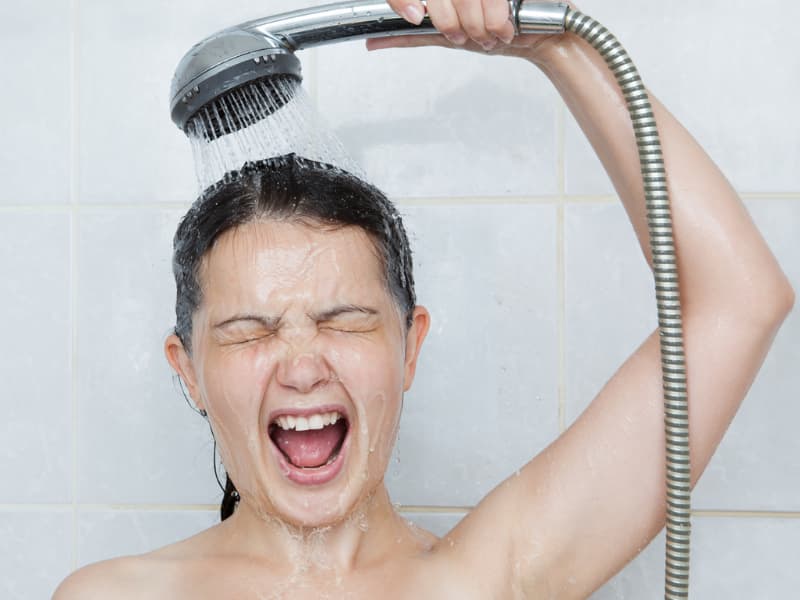In your hunt for a water heater, you should remember that its size will affect the shower duration you can acquire from it. If you have ever taken a hot shower, you know how frustrating it is to lose hot water when showering. Thus, it is essential to choose the appropriate size of shower heater for your shower requirements.
A 40-gallon water heater can provide 2 showers per hour if you’re not using any other water appliances. The average shower uses 2.1 gallons per minute, with an average shower duration of 8.2 minutes. As such, each shower uses about 17.2 gallons. Two showers will thus be about 34.4 gallons.
Knowing the shower’s flow rate, the duration of a shower, the frequency of showering, and the type of showerhead you have goes a long way in knowing exactly what to expect from a 40-gallon water heater. This figure is different to when you use a bathtub as the latter use more water.

How much water does a shower use?
Washing clothes and flushing toilets are the most common uses of water at home. With showers in the third position, you’ll be surprised to discover that your shower averagely uses 2.1 gallons per minute.
To determine how much water the shower uses, we multiply the 2.1 gallons per minute average flow rate by the average shower duration of 8.2 minutes. Thus, the average water use in a shower is 17.2 gallons. If a shower runs up to 10 minutes, you’ll use 21 gallons of water.
The amount of water used in the shower can be summed. Typically, most Americans take one shower per day. Rounding the 17.2 gallons average amount of water used per shower, it comes to 120 gallons per week for every individual in the US. When calculated annually, each person uses 6,261 gallons, while a family of four uses about 25,043 gallons.
Factors that determine how much water you use in the shower
Generally, the actual amount of water used in the shower can go above the average amount. Reducing the water used in the shower is a practical energy-saving approach. Here are factors that affect the amount of water used in a shower:
1. The shower’s flow rate
The flow rate is the speed and quantity of water passing through the faucet at a given time. The higher the flow rate, the more water your shower will use.
2. Shower duration
If you extend your shower above the average duration of 8.2 minutes, you could also increase your water usage. If you use bathbombs in the shower or have other shower routines, the time and water taken to shower will be longer.
3. Shower frequency
If you shower more times per day, the amount of water used will increase.
4. Type of showerhead
The shower massage and power shower heads with a high-pressure use more water than ordinary models.
How many showers for a 40-gallon water heater?
A 40-gallon water heater can offer you 2 showers per hour when you’re not using other water appliances. Additionally, this will depend on the duration of the showers.
We’ll run over some numbers to help you discover whether you can acquire two showers from a 40-gallon water heater. Below are some hot water-consuming functions with their water requirements in gallons per use:
| Appliance | Water Usage (Gallons) |
| Dishwasher | 6 |
| Shower | 10 |
| Clothes washer | 25 |
| Bathroom & Kitchen faucet | 2 gallons/minute |
If you use your water heater for showers only, your 40-gallon water heater can comfortably serve 2 average-lengthed showers simultaneously (17+17=34 gallons).
Now, let’s figure out whether you’ll need to shower in the morning or perform all the operations mentioned above during the same hour (assuming you are taking an average-length shower). If that’s the case, you will use 41+ gallons of hot water – a 40-gallon water heater might not be enough to serve your needs.
However, if people living in your house shower within the same hour or you take longer showers than average, your water heater may run out of water fast.
Try as much as possible for many showers with your 40-gallon water heater to avoid other appliances requiring hot water. Also, you can take shorter showers to prevent your water heater from depleting hot water fast.
Water heater running out of hot water too fast
Your water heater could be running out of hot water due to one of the following reasons:
1: Thermostat issues
Every water heater has a small gadget called a thermostat that monitors the temperature of the heated water. Sometimes these devices malfunction or break down, limiting the ability of the water heater to warm water. Cold water can also cause low pressure in the shower.
Solution
Hire a professional plumber to inspect your water heater thermostat to ensure it usually functions.
2: Building up of sediments at the base of the water heater tank
Water that enters our home tanks contains tiny particles which can accumulate at the base of your water heater tank.
The buildup of these sediments minimizes the amount of hot water your water heater can produce since these sediments occupy an ample space that can be used for storing hot water.
Solution
Hire a professional for water heater flushing services. These services will help to remove all sediments that may have buildup.
3: Aged water heater
Water heaters lower their ability to heat water properly over the years.
You can imagine a car. Aged cars generally require regular maintenance and repairs and don’t function like new cars with low mileage. It’s almost similar to water heaters; they will not heat water faster than they used when they were new.
Solution
If your water heater has attained its life span (10+ years), it is the best time to replace it. You can reach out to your plumber, who will provide estimates for your new water heater installation.
Tips for saving the amount of water used in a shower
Here are some practical energy-saving tips for saving water in your shower:
1. Control the duration of your showers
If you minimize your regular shower duration by one minute, you can save many gallons of water annually and lower the associated costs of heating water. To achieve this, you only need to consider using water conservation tips during a shower.
2. Install a lowflow showerhead
You can replace your regular showerhead with the available low-flow types. Some designs aerate the water to offer a satisfying misty spray. Laminar-flow showerheads produce water streams that are effective for rinsing.
With any option, consider replacing old showerheads built in the early 90s since they have a high flow rate of over 5.5 gallons/minute.
You can easily measure your showerhead’s flow rate by a 1-gallon bucket below the showerhead and timing the duration it takes to fill. If it takes over 20 seconds to load, you should consider replacing the showerhead with a modern replacement.
3. Consider an occasional navy shower
A Navy shower entails turning off the water as you apply soap and shampoo on your body, then turning it on to rinse. This can help lower the water flow by at least 5 minutes. If you are comfortable with a cold shower, you can save a lot in your overall shower.
4. Lower the frequency of showers
You may consider skipping some days for a shower. Typically, some people think it is an energy-wasting habit. Other times, spot-washing can be enough.
You can minimize dry skin as you enjoy multiple health benefits while reducing the amount of energy and water used.
Summary
A 40-gallon water heater can offer you about 2 showers per hour under the average shower duration of 8.2 minutes. However, this number may differ depending on the water flow rate, shower duration, usage of other hot water appliances, and the type of showerhead.
Your shower may be running out of hot water due to the age of the water heater, thermostat problems, and the buildup of sediments at the base of your water tank.
Thankfully, I have discussed the solutions to these problems and identified feasible tips for saving the amount of water you use in a shower.
